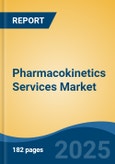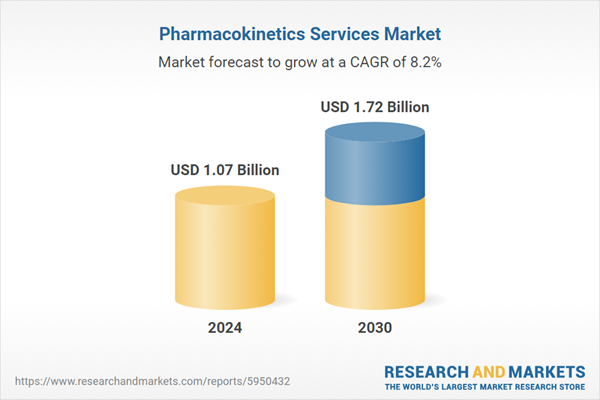Biotechnology and Pharmaceutical Companies is the fastest growing segment, North America is the largest market globally
Speak directly to the analyst to clarify any post sales queries you may have.
10% Free customizationThis report comes with 10% free customization, enabling you to add data that meets your specific business needs.
Key Market Drivers
The global pharmacokinetics services market is significantly driven by the rising complexity of drug development and the increasing demand for biopharmaceuticals. Modern drug development increasingly targets intricate novel entities, especially for rare diseases and personalized medicine, which necessitates highly specialized pharmacokinetic analysis. This heightened complexity demands sophisticated study designs and advanced analytical techniques to understand drug behavior in diverse patient populations. According to a research article in the British Journal of Pharmacology, in March 2024, "Novel drugs approved by the EMA, the FDA, and the MHRA in 2023: A year in review," over half of the seventy novel drugs authorized in 2023 targeted rare diseases or intractable forms of cancer, underscoring this industry shift towards challenging therapeutic areas.Key Market Challenges
The substantial costs and inherent complexities associated with conducting advanced pharmacokinetic (PK) studies present a significant impediment to the growth of the Global Pharmacokinetics Services Market. The specialized equipment, highly skilled personnel, and extensive validation required for these studies, particularly for complex biologics and personalized therapies, translate into considerable financial outlays. This financial burden can restrict the number of drug candidates that companies, especially smaller biotechnology firms, can advance into development, thereby limiting the overall demand for PK services.Key Market Trends
The integration of Artificial Intelligence and Machine Learning into pharmacokinetic modeling represents a pivotal trend reshaping drug development by enhancing efficiency and predictive accuracy. These advanced computational methods enable the processing of extensive datasets, improving the prediction of drug absorption, distribution, metabolism, and excretion (ADME) properties with greater precision than traditional approaches. According to a December 2023 survey by Rackspace Technology and Dell/VMware, 68% of pharmaceutical businesses identified pervasive AI as having the highest potential impact on their business, indicating a strong industry recognition of this technology's transformative power. This integration allows for more informed decision-making earlier in the development pipeline, potentially reducing the need for costly in vivo experiments and accelerating the identification of promising drug candidates.Key Market Players Profiled:
- Evotec AG
- Certara, L.P.
- Pacific BioLabs
- GVK Biosciences Private Limited
- Shanghai Medicilon Inc.
- Pharmaceutical Product Development, LLC
- Charles River Laboratories International, Inc.
- PAREXEL International Corporation
- Eurofins Scientific SE
- Frontage Labs
Report Scope:
In this report, the Global Pharmacokinetics Services Market has been segmented into the following categories:By Drug Type:
- Small Molecules
- Large Molecules
By Application:
- Small and Medium Enterprise
- Large Enterprise
By End-Use:
- Biotechnology & Pharmaceutical Companies
- Academic & Government Research Institutes
- Others
By Region:
- North America
- Europe
- Asia Pacific
- South America
- MEA
Competitive Landscape
Company Profiles: Detailed analysis of the major companies present in the Global Pharmacokinetics Services Market.Available Customizations:
With the given market data, the publisher offers customizations according to a company's specific needs. The following customization options are available for the report:- Detailed analysis and profiling of additional market players (up to five).
This product will be delivered within 1-3 business days.
Table of Contents
Companies Mentioned
- Evotec AG
- Certara, L.P.
- Pacific BioLabs
- GVK Biosciences Private Limited
- Shanghai Medicilon Inc.
- Pharmaceutical Product Development, LLC
- Charles River Laboratories International, Inc.
- PAREXEL International Corporation
- Eurofins Scientific SE
- Frontage Labs
Table Information
| Report Attribute | Details |
|---|---|
| No. of Pages | 182 |
| Published | November 2025 |
| Forecast Period | 2024 - 2030 |
| Estimated Market Value ( USD | $ 1.07 Billion |
| Forecasted Market Value ( USD | $ 1.72 Billion |
| Compound Annual Growth Rate | 8.2% |
| Regions Covered | Global |
| No. of Companies Mentioned | 10 |









